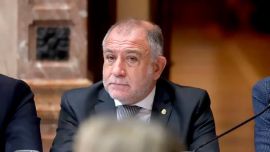Today’s column beginning the round-up of the non-ministerial officials named by President Alberto Fernández exactly half a year ago, last December 6, will focus on the trident working directly under him – presidential Chief-of-Staff
Julio Vitobello, Legal and Technical Secretary Vilma Ibarra and Strategic Affairs Secretary Gustavo Beliz – plus the new Treasury Attorney Carlos Zannini, on the grounds that he held down Ibarra’s job for a dozen years. Julio Fernando Vitobello, 63, is the least-known of this quartet while occupying nominally the most important post (at least as measured in White House terms even if the chiefs-of-staff are not walking tall under the current Donald Trump administration). A lawyer born in this city like President Fernández and a close friend of the Peronist leader, Vitobello headed two watchdog agencies – SIGEN comptrollers (2007-2009) and the Anti-Corruption Office (2009-2015) – somewhat passively during Kirchner presidencies, a low profile which he has only intensified in his current responsibilities even before the pandemic, presenting zero threat to presidential protagonism.
The post has existed since the return of democracy in 1983 although not beforehand. The earlier secretaries-general of the presidency were often very much right-hand men – Germán López with Raúl Alfonsín, Alberto Kohan and Eduardo Bauzá under Carlos Menem, Fernando de la Rúa’s own brother Jorge – but this aspect gradually lost ground to the Cabinet chief post (created in 1995). A total of 13 men (always men) have occupied the position with current Senator Oscar Parrilli (2003-2014) by far the longest-serving and, paradoxically, perhaps also the most insignificant – the ineffable Aníbal Fernández had two brief stints. At times a glorified butler, the chief-of-staff’s tasks in this century have been arranging presidential audiences, designing policies and protocol duties of all kinds including presidential transport, sometimes also rising to be a speechwriter.
Vilma Lidia Ibarra, 60, sister of 2000-2006 Buenos Aires City Mayor Aníbal Ibarra and the girl- friend of Alberto Fernández for a full decade (she would have been a potential first lady as recently as 2015), has served in both houses of Congress – as senator from 2001 to 2007, followed by a term as deputy. Lucky to clear the vice-presidential filter to enter the Cabinet because her book Cristina versus Cristina made the ex-president seem a walking contradiction and total schizophrenic (as the title might suggest). She never belonged to the main Kirchnerite party, moving from the Frente Grande of former vice-president Carlos “Chacho” Alvarez to the Nuevo Encuentro of Martín Sabbatella (with whom she shares a Communist youth).
Just like the chief-of-staff, the legal and technical secretary post dates back to the return of democracy in 1983. It is a linear job, entirely centred on drafting all legislation emanating from the executive branch while ensuring its consistency with constitutional norms. The plethora of emergency decrees during the pandemic has kept Ibarra busy and she is known to work particularly hard but sometimes the wording is sloppy, lacking the clarity of text where the otherwise far more controversial Zannini was rarely at fault. Since 1983 this secretary has generally been a backroom boy who- se name rarely reaches the general public – apart from Zannini (2003-2015), the main exceptions would be Raúl Granillo Ocampo (1989-1991) due to the Swiftgate scandal and the factotum Carlos Corach (1992-1995), both under Carlos Menem. Thus you could ask around in the street for hours without finding anybody who could name the legal and technical secretary in the still recent Mauricio Macri presidency (Pablo Clusellas).
Gustavo Osvaldo Beliz, 58, has a political career stretching back three decades, starting in 1989 as the whizzkid head of Menem’s civil service as Public Administration Secretary at the age of 27. He advanced to Interior Minister (1992-1993), falling out with Menem over corruption and the 1994 constitutional reform. He then shifted to municipal politics, eventually joining former economic czar Domingo Cavallo as his running-mate in the 2000 City mayoral elections (won by Ibarra’s brother). While in national politics he championed the urgency of a professional civil service and while in municipal the idea that cities rather than nations were the real motors of an increasingly globalised world. Campaigning for the Frente para la Victoria (“Victory Front,” FpV) in 2003, he became Néstor Kirchner’s first Justice minister (2003- 2004) but was forced into political exile after clashing with the intelligence services by pointing a finger at the now famous Jaime Stiuso. Most of the next 15 years were spent in the United States working at the Inter-American Development Bank (BID, in its Spanish acronym).
His job as Strategic Affairs secretary has no real history, being largely an invention to find a place for the Beliz brainpower within the Alberto Fernández administration. About the only antecedent was Menem making the cerebral Jorge Castro his Strategic Planning secretary for very similar reasons as a one-man think tank. Close to the president, who consults him constantly, Beliz is a strategic visionary but pandemics are times for tactics and his full impact may have to wait awhile.
Treasury Attorney Carlos Alberto Zanini, 65, is of Córdoba working-class birth and was a Maoist revolutionary in his youth (imprisoned 1975-1978). He held Vilma Ibarra’s new job throughout the three Kirchner presidencies (2003- 2015), at the end of which he was made the 2015 Peronist vice-presidential running-mate of Daniel Scioli to keep a Kirchnerite foot in the door, but the ticket lost to Macri.
Moving down to Patagonia at the return of democracy in 1983 and befriending the Kirchner couple almost immediately, Zannini made a career in Santa Cruz public service over the next two decades with provincial interior minister his most important post. After Néstor Kirchner’s death in 2010, he became almost the alter ego of Cristina Fernández de Kirchner, his importance far transcending his nominal post of legal and technical secretary. His 2015 defeat cost him 100 days in prison in the summer of 2017-2018 (at the height of Macri’s political fortunes), charged with co- drafting the memorandum of understanding with Iran – a case still pending which he now has a role in resolving.
Zannini’s new job is extremely nebulous. Unlike the preceding three posts, it falls nominally under the Justice Ministry rather than directly under the presidency. It was created by Bartolomé Mitre way back in 1863 to replace the attorney-general, with whom Mitre was evidently at odds, but the office of Attorney-General has since returned without its Treasury counterpart going away. The Treasury label is entirely misleading since this organ has a writ to intervene in legal matters involving the state and administrative audits of all kinds, also representing Argentina legally abroad. In short, a virtual total overlap with the attorney-general and with that office vacant since 2017, Zannini has a free run for some time to come.























Comments